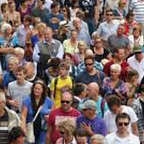What is Freedom?
Why freedom’s greatest enemy is freedom
The definition of freedom is: “the power or right to act, speak, or think as one wants without hindrance or restraint. The state of not being imprisoned or enslaved.”
Wikipedia also states, “Freedom, generally, is having the ability to act or change without constraint. Something is “free” if it can change easily and is not constrained in its present state. … A person has the freedom to do things that will not, in theory or in practice, be prevented by other forces.”
Keeping this concepts in mind, what does it look like for a people to be free? Let’s quickly revisit our definitions. Freedom, if we use the statements above as our guides, is being empowered to:
- act as we want with no restraint
- speak as we want with no restraint
- think as we want with no restraint
- do things that will not be prevented by other forces
It is the opposite of being restrained.
But while we want freedom, do we really want no restraints? Most would agree that some restraints are necessary. Some guidelines are important for a civil society. But who gets to decide what we should be able to do with no restraint and what we shouldn’t? Who decides that they are right?
To some, it is a higher power. To others, it is humanity. The challenge is that we desire freedom for ourselves, but restraint and structure for others. We believe our motives are just, good, even righteous, so we should be given freedom. But others may be corrupt, misguided, even downright wrong — so they need restraint.
This all brings us to the bigger question. What is good? If we are all good, then freedom is easy. We need no restraints because we always do what is right. But, we aren’t all “good” — because we no longer agree on what good and right mean.
Humanity in ourselves cannot define goodness and rightness without demanding it through laws. Religion is quickly being rejected for this. We don’t like some laws, so we reject them. We like other laws, so we demand enforcement. But I would like to argue that we will never be able to agree on what laws should always be enforced unless those laws are defined outside of humanity. We will always strive to be in power, to lead, to follow, to be driven by emotions while justifying with logic, to oppress and abuse, we’re just easily corruptible as a species.
So freedom can never exist without boundaries, restriction. Freedom’s greatest enemy is the very concept of freedom itself. Without limits, our desire for freedom will result inevitably in chaos, even in a civilized society. Or — it will be enforced by an oppressor who determines laws for all and demands we follow them.
